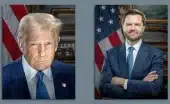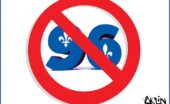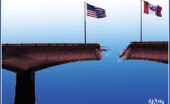Molly Minturn - My family is heartbroken to share that my father died in surgery on Monday, Feb. 10. It…
Wednesday Night #2078
Written by Diana Thebaud Nicholson // January 12, 2022 // Wednesday Nights // Comments Off on Wednesday Night #2078
On Tuesday’s Diplomatic Community Jeremy Kinsman and Larry Haas discussed the U.S.-Russia talks in Geneva, emphasizing that they are at the Act I theatrics stage. Jeremy presents convincing arguments that Putin does not want war, but both wants and needs recognition of Russia as an equal partner (even if it is not). They then turned to holding Iran accountable for the deaths of 167 people on Flight PS752 two years ago: what will work to bring justice? in light of the recent Ontario court decision awarding more than $107 million to families of six victims of the Iranian military’s downing of the flight. Both expressed strong reservations about invoking the May ruling that the missile strikes amounted to an intentional act of terrorism in attempting to negotiate with Iran.
The NATO-Russia Council US met on Wednesday,the first meeting of its kind in over two years. AP reports “That Russia’s delegation did not walk out of the talks and remained open to the prospect of future discussions after having its main positions rebuffed were seen as positive notes in a week of high-level meetings aimed at staving off a feared Russian invasion of Ukraine.”
And, while the world was focused on Ukraine, another series of events was unfolding as Kazakhstan’s President Kassym-Jomart Tokayev called on Russia to quell the violent protests, provoked by a policy change for the pricing of liquified petroleum gas… . Prices spiked in a matter of days. In the region where the protests began, the cost of fuel doubled.
While the pundits worried about geopolitical ripples, As Kazakhstan Descends Into Chaos, Crypto Miners Are at a Loss – The central Asian country became No. 2 in the world for Bitcoin mining. But political turmoil and power cuts have hit hard, and the future looks bleak.
On Monday, a court in Myanmar sentenced ousted leader Aung San Suu Kyi to four years in jail on charges including possession of unlicensed walkie-talkies.
She is now on trial in nearly a dozen cases that carry combined maximum sentences of more than 100 years in prison.
Boris Johnson seems to be in deep trouble after he admitted attending a garden party in lockdown, claiming he thought it was a “work event”.
However, on the home front, any international news paled by comparison to the announcement by Premier Legault that Unvaccinated Quebecers will have to pay a health tax
Julius Grey told CTV News “there is no question” that it is a clear violation of the Charter of Rights and Freedoms, but said he believes if an individual or group challenges it, whether it’s upheld in court will be a “close call.”
“On the individual side, this is a major attack on my integrity, my freedom,” Grey summarized the argument he predicted, and meanwhile, “there are other things the government could do” to accomplish its goals.
On the other hand, the counter-argument goes, “we’ve tried all sorts of things and Omicron is particularly contagious… and the government would get an expert to say there’s a real threat to the medical system and we might not get beds and so on.”
It’s a complicated question, he said.
“It’s not a discriminatory tax. It’s a way of trying to force vaccination, and while that is a clear and major Charter violation, I am not certain what the result will be… It could be argued both ways.”
It is evident from many posts and exchanges that many individuals would like to see this happen, but as Margaret Lefebvre wisely interjects, if it is unenforceable, then the effort would only contribute to increasing distrust of politicians and public policies.
As illustrated by Josh Freed: François Legault’s ‘common sense’ curfew makes zero sense
When Quebec announced curfew 2.0, health officials readily admitted they had no scientific proof it works or that it worked last time.
One more note on the pandemic: it was inevitable that we would hear from Jordan Peterson, but how we wish it were not so: Open the damn country back up, before Canadians wreck something we can’t fix – The country is growing more authoritarian in response to fear
Varia
Politico Ottawa Playbook reports on some notable high-profile meetings for the new U.S. Ambassador to Canada David Cohen. It is encouraging to see the range of individuals he is consulting and their expertise.
Just in case you had doubts:
Conspiracy theorists lack critical thinking skills: New study
The French researchers ran two studies, where they assessed the critical thinking skills of 338 undergraduate students …and then scored the students’ tendencies towards conspiracy beliefs and their personal assessment of their critical thinking skills.
Centre span of the old Champlain Bridge comes down
“Although this type of work is carried out occasionally around the world, it has never been done on this scale in Canada, especially in winter conditions and under the operational constraints of this project.”
The large span of the bridge will be held in a facility in Brossard until the pieces are dismantled in the spring, at which point they can be recycled to be used in another project. “90 per cent of the 287-tonnes of materials from the project will be recycled and reused,” said Oliver Vincent, an engineer with the project, in a video published by the federal agency on Thursday.
Long Listen
Future with conscious androids requires serious ethical consideration, says philosopher
Stuart Russell, professor of computer science at UC Berkeley and founder of the university’s AI lab is this year’s speaker for the BBC Reith Lectures. In his series, he warns that as AI technology spreads rapidly through the worlds of business, warfare, and our personal lives, there is a risk of losing control.
Listen to all four of Russell Stuart’s BBC Reith Lectures where he examines the impact of AI on jobs, military conflict and human behaviour. He also shares his suggestions on a way forward based on a new model for AI, one based on machines that learn about and defer to human preferences.
Pay special attention to Episode 3: AI in economy
Long reads
Global Growth to Slow through 2023, Adding to Risk of ‘Hard Landing’ in Developing Economies according to the World Bank’s latest Global Economic Prospects report.
Around the halls: Russia, Ukraine, Kazakhstan, and the European security order
What are Russian President Vladimir Putin’s intentions? How should the U.S. and its allies respond to Russia’s moves? What are the implications of the Kazakhstan uprising? Brookings experts reflect on recent developments in the former Soviet Union and offer policy recommendations.
There has been a lot written recently from the Canadian perspective about deteriorating Canada-U.S. relations; Allison Fedirk‘s long piece for Geopolitical Futures The US Can’t Take Canada for Granted – Washington’s recent moves contribute to political division up north and risk destabilizing a critical relationship is a welcome addition from the U.S.



